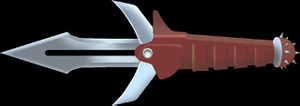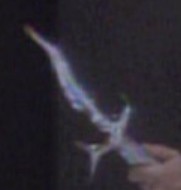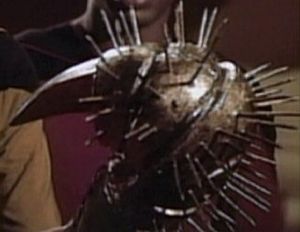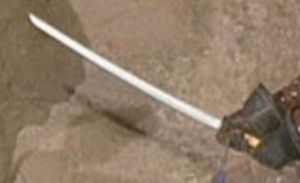Contact Weapons
Although it seems incredible that clubs, swords and daggers could survive in this age of shields and energy weapons, many cultures continue to use these types of weapons in the 24th century. For the most part this is a matter of tradition rather than practicality - bladed weapons are employed alongside their modern counterparts and used only in close quarter fighting. Probably the most famous exponents are the Klingons; for this race of warriors there is no more honourable form of combat than the use of a blade, and virtually every member of the society is expected to become at least proficient with them.
On occasion such ancient weaponry can even prove to be a significant advantage. The modern battlefield is an environment where dampening fields can be commonplace, and although regenerative phasers can operate within most forms of field there are still occasions when phasers, disruptors or even simpler weapons will not function. In such cases the side with the most skill at swordplay will often have a crucial advantage.
Bat'leth
Probably the most famous of all edged weapons, the first bat'leth is said to have been forged when Khaless the Unforgettable dropped a lock of his hair into the Kri'stak volcano and then plunged the burning hair into the Lursor lake and twisted it into a blade. Khaless used the weapon to defeat the tyrant Molor before naming it bat'leth, or ""sword of honour". The Sword of Khaless was for many centuries one of the Klingons most important relics, but it was stolen about 1,000 years ago by the Hur'q invaders. Many attempts have been made to find the sword since this time, including a mission led by the Dahar master Kor in 2372, but all failed.
The Modern bat'leth is a simpler and less ornate weapon than the original. The weapon vaguely resembles a double-ended scimitar, with three handholds built into the back edge of the main blade and an additional pair of points inside the main ones. The weapon is usually held along the inside of the arm, and a whole form of martial art has been developed around this weapon. Size and mass vary according to the preference of the user, but a typical warriors fit is 116 centimetres long with a mass of 5.3 kilograms. The bat'leth is composed of Baakonite.
Mek'leth
Although far less famous than the bat'leth, the smaller size of the Mekleth makes it a more effective weapon at closer ranges and in the right hands it is more than capable of holding its own. The mek'leth is also more easily concealed. The weapon is relatively uncommon even amongst Klingons, as it takes significantly more skill to use effectively.
D'K'tahg
The D'K'tahg is a vicious three bladed knife carried by almost every Klingon. It is commonly used in hand to hand combat, but more importantly it is of great ceremonial value to the Klingons. To a Klingon warrior the D'K'tahg is a representation of his or her personal honour - to take the knife from a warrior is to steal their honour, and is a terrible insult. The D'K'tahg features in many Klingon rituals. It has been in use since at least the mid 22nd century - Malik used a D'K'tahg to kill Persis on the Klingon Bird of Prey they captured in 2154.
Lirpa
The Lirpa is a traditional Vulcan weapon. It is composed of a wooden shaft a little over a metre in length, with a cresent blade on one end and a large club on the other. The blade is extremely sharp, capable of cutting through metal. Lirpas are one of the weapons available for use in the kal-if-fee challange which formed a part of Vulcan mating rituals. The Vulcan military has also used Lirpas on occasion when energy weapons could not be used - for instance, in the short Vulcan civil war of 2154 patrols in the Forge used Lirpas as the energy dampening fields in the area made energy weapons useless. These weapons had smaller blades and clubs than the ceremonial version in order to improve their handling characteristics.
Nisroh
A ceremonial weapon of the Tilonians, the Nisroh is used in their traditional bartering ceremony. Potential traders are judged with their prowess with the blade. In 2369 Riker's mind included the Nisroh as part of a complex fantasy which it created to resist attempts to probe his thoughts by a Tilonian interrogator.
Glavin
A weapon employed during challenges to the Ligonian Right of Supercedence. Prior to 2364 the challange had not been employed in more than two hundred years, but the women of the planet had a tradition of preparing themselves for the accompanying combat. These weapons were designed to be light and easy to handle, so as to facilitate their use by women. The spines and the large stabbing point are both coated with a lethal alkaloid based poison.
In 2364 one of the Ligonian leaders, Lutan, attempted to replace his wife Yareena with Lieutenant Yar of the Enterprise-D. Yareena challenged the supercedence, and she and Yar fought with these weapons. Yar was successful in the challenge, but Dr. Crusher was able to revive Yareena after her death.
Spears
The first spears were essentially knives tied to the end of a wooden shaft. The shaft allowed the wielder to use his weapon at a distance of several feet beyond normal knife range, giving a great advantage over short handheld weapons. This advantage could be extended further by throwing the spear to give extra reach. Over time spears became somewhat more sophisticated, but in essence even the most advanced models are little different to the originals.
The natives of Taurus II used spears which were similar in construction to the Folsom Point, a weapon discovered in 1925 near Mexico, North America. The Taurus II weapon was a little more crude about the shaft, and was considerably larger than Earth weapons in line with the larger bulk of the natives who built them. It was not a very efficient weapon, though it worked well enough to kill a crewmember of the USS Enterprise who was stranded on the planet.
Samurai Sword
More accurately known as a Katana, this is a type of sword used on ancient Earth by the Japanese. The Samurai Sword is reknowned as being one of the highest quality weapons of the kind ever to be produced. The blade was one of the few to combine a sharp cutting edge with the great hardness required in a combat weapon. The latter was a result of good materials and advanced construction methods. The slight curvature of the weapon also reduced the length of blade in contact with the target on any given blow, increasing the pressure and so enhancing the cutting effect.
The Samurai sword became so famous on Earth that their strength and sharpness became almost legendary, and many myths spread concerning their effectiveness - even into the 21st century Samurai swords were commonly appearing in fictional works as contemporary weapons alongside projectile weapons which had long ago rendered them obsolete in the real world. One popular myth was that the repeated folding of the metal resulted in a blade composed of millions of layers with super-strong properties. Another story claimed that the swords reflected the personality of their creator, making some weapons particularly prone to being involved in violence. Whilst no weapon of this type could possibly live up to the more exaggerated stories, it is indeed true that the Samurai sword was a formidable weapon for its time.
When the USS Enterprise visited an alien pleasure planet in 2267, the machinery there created various items out of the imagination of the crew. Amongst these was a Samurai warrior complete with sword.
Ahn-Woon
A Vulcan ceremonial weapon, the Ahn-woon is little more than a strip of flexible material which can be used as a whip, or to entangle an enemy's feet. It is used during the Koon-ut-kal-if-fee ceremony alongside the Lirpa.
Gin'tak
A spear used by the Klingons. The gin'tak was intended for battle; when Worf found a group of Klingons who had lived for decades in Romulan captivity, he was distressed to find their children using the weapons as farming tools.
Qu'vak
A short Klingon spear. The Qu'vak is used to hone the skills of the hunt - a metal hoop is rolled across the ground and the Qu'vak is thrown, with the intent being to throw it through the centre of the hoop. When Worf found a group of Klingons who had lived for decades in Romulan captivity, he was distressed to find their children using the weapons as farming tools. He instructed them in the proper use of the Qu'vak as a way of introducing them to their heritage.
Dagger
A dagger is a double-edged knife commonly used by primitive cultures. They can be used as contact weapons to stab or slash at the enemy, or can be thrown.
In the mirror universe, officers carried daggers as part of their standard duty uniform. The Dolhman of Elaas also carried one when she travelled aboard the Enterprise-D in 2268, and used it to stab Ambassador Petri.
Rapier
A type of sword commonly used in Europe around the 1600s, the rapier had a slender blade, a sharp point and often an elaborate hilt and hand-guard. Most rapiers were double-edged, though some later weapons were single-edged or even edgeless. A rapier can both slash and stab an opponent, with stabbing as the main form of attack. Rapiers were commonly used in duels. By the year 1700 they had largely been replaced by the lighter smallsword, though competitive sporting use continued for many centuries afterward.
Even as late as the mid 2200s rapiers were still used in fencing; Lieutenant Sulu owned one whilst he served aboard the USS Enterprise. Under the influence of the PSI 2000 syndrome he menaced various Enterprise crewmembers with it.
Ushaan-Tor
The Ushaan is a traditional duel to the death practiced by the Andorians. The Ushaan-Tor is the usual weapon used in the combat. It is actually a tool used by ice miners; Andorian children frequently play with Ushaan-Tors as toys, and the average Andorian is very well practiced in their use. In 2154 Captain Archer participated in the Ushaan with Commander Shran, taking the place of the Tellarite who had killed Shran's mate Talas so as to preserve the tentative alliance between the Andorians and Tellarites.
Source
- This information is courtesy of the Daystrom Institute Technical Library and copyright Graham Kennedy.













